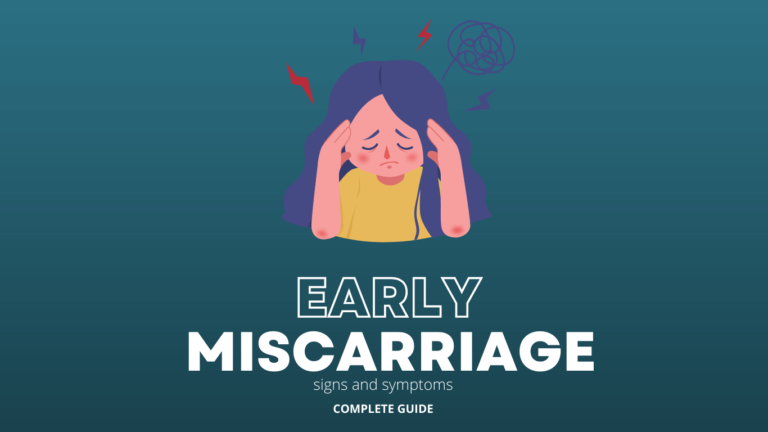Pregnancy is a beautiful and exciting time, filled with anticipation and hope for the future. However, it can also come with worry and fear, especially when it comes to the possibility of miscarriage. Understanding the early signs and symptoms can help expectant mothers feel more prepared and informed, easing some of the anxiety that can accompany pregnancy. In this comprehensive guide, we’ll explore the early miscarriage signs and symptoms, what to look for, and when to seek medical attention. Whether you’re currently expecting or planning to become pregnant, this information is crucial for any mother-to-be.
What is a Miscarriage?
Understanding the Basics
A miscarriage is the spontaneous loss of a pregnancy before the 20th week. It is a common occurrence, with about 10-20% of known pregnancies ending in miscarriage. However, the actual number is likely higher, as many miscarriages occur before a woman even knows she’s pregnant.
Types of Miscarriage
There are several types of miscarriage, each with its own characteristics:
- Threatened Miscarriage: This occurs when there is bleeding, but the cervix remains closed.
- Inevitable Miscarriage: Involves bleeding and cramping, with an open cervix, indicating that miscarriage is inevitable.
- Incomplete Miscarriage: When some, but not all, of the pregnancy tissue has been expelled.
- Complete Miscarriage: When all pregnancy tissue has been expelled from the uterus.
- Missed Miscarriage: Occurs when the fetus has died, but the body does not expel it.
Why Do Miscarriages Happen?
Most miscarriages occur due to chromosomal abnormalities in the developing baby. Other factors can include hormonal imbalances, uterine abnormalities, and underlying health conditions. Understanding these causes can help provide some context for this difficult experience.
Early Signs and Symptoms of Miscarriage
Spotting and Bleeding
Spotting or light bleeding is a common early sign of miscarriage. While not all bleeding leads to miscarriage, it is essential to monitor the amount and color of the blood. Bright red blood or heavy bleeding may indicate a more serious issue.
Cramping and Pain
Mild cramping can be normal in early pregnancy, but severe or persistent pain should not be ignored. Cramping that is accompanied by bleeding is a more concerning sign and may indicate a miscarriage.
Back Pain
Lower back pain, similar to menstrual cramps, can be an early sign of miscarriage. This pain may be persistent and can range from mild to severe.
When to Seek Medical Attention
Recognizing the Red Flags
If you experience any of the following symptoms, it is essential to contact your healthcare provider immediately:
- Heavy bleeding (soaking through a pad in an hour)
- Severe cramping or abdominal pain
- Passing of tissue or clots
- Dizziness or fainting
Importance of Prompt Medical Care
Seeking prompt medical care can help manage the symptoms and provide necessary support. Your healthcare provider can conduct examinations and tests to determine the cause of the symptoms and offer appropriate treatment.
Emotional Impact of Miscarriage
Coping with Grief
Experiencing a miscarriage can be emotionally devastating. It is essential to acknowledge your feelings and seek support from loved ones or professional counselors.
Seeking Support
Many women find comfort in joining support groups where they can share their experiences and feelings with others who have gone through similar situations. Online forums and local groups can provide a sense of community and understanding.
Taking Care of Yourself
Self-care is crucial during this time. Allow yourself to grieve and take the time you need to heal emotionally and physically. Engage in activities that bring you joy and relaxation.
Preventing Miscarriage
Healthy Lifestyle Choices
While not all miscarriages can be prevented, adopting a healthy lifestyle can improve your chances of a successful pregnancy. This includes maintaining a balanced diet, exercising regularly, avoiding smoking and alcohol, and managing stress.
Regular Prenatal Care
Regular check-ups with your healthcare provider can help monitor your pregnancy’s progress and address any potential issues early on. Prenatal vitamins and proper medical care are essential components of a healthy pregnancy.
Understanding Your Body
Paying attention to your body’s signals and knowing what is normal for you can help you identify any unusual symptoms early on. Communicate openly with your healthcare provider about any concerns you may have.
Conclusion
Understanding the early signs of miscarriage and knowing when to seek medical attention can empower expectant mothers with the knowledge and confidence they need. While miscarriage is a challenging and often heartbreaking experience, being informed can provide some comfort and help you take proactive steps in managing your pregnancy.
Remember, you are not alone. Seek out support from healthcare providers, loved ones, and support groups to help you through this difficult time. For those looking for further guidance and personalized support, don’t hesitate to reach out to a healthcare professional who can assist you on your pregnancy journey.
By staying informed and connected, you can navigate the challenges of pregnancy with confidence and care.
For more information on pregnancy complications and what to look out for, you can visit our detailed guide on pregnancy complications. This resource provides comprehensive insights on various issues that might arise during pregnancy and how to manage them.
Join Our Community!
Are you looking for support, advice, or just a friendly chat about pregnancy and parenting? Join our community on Facebook! Connect with other parents, share your experiences, and get answers to all your questions.


Comments are closed.